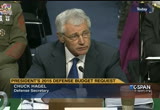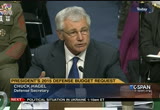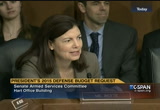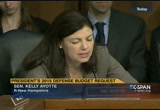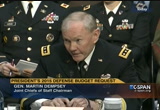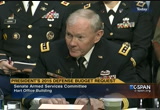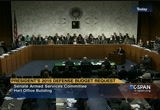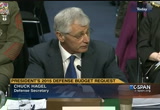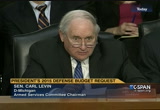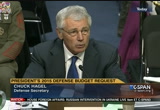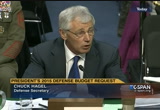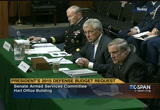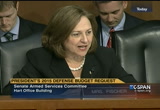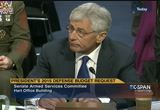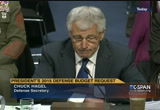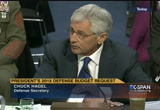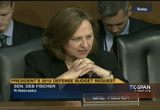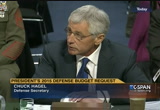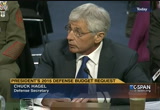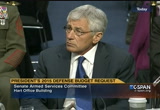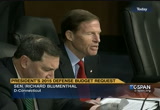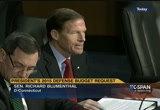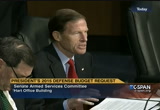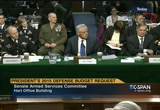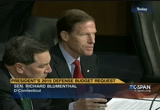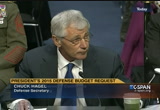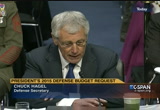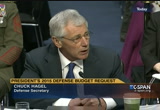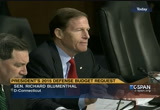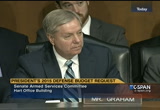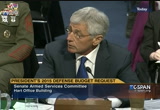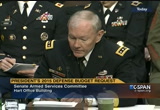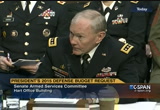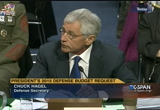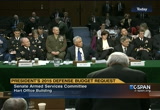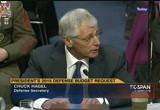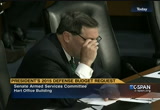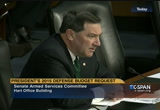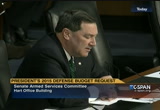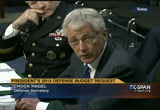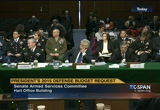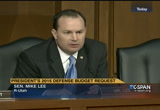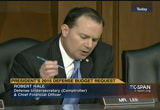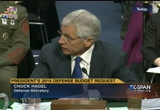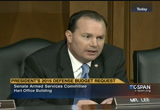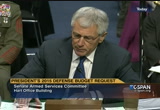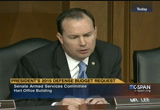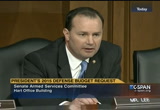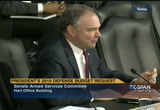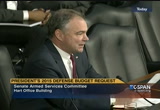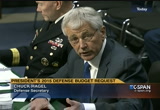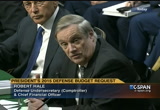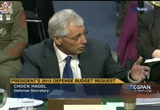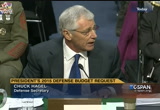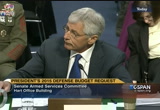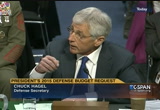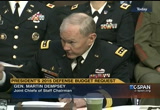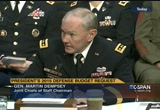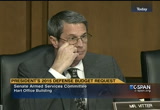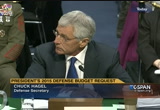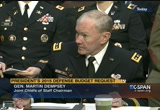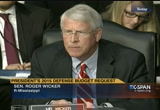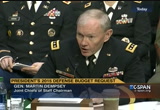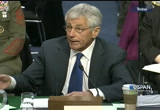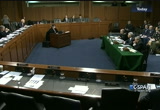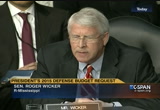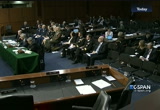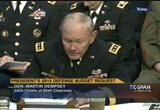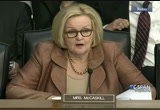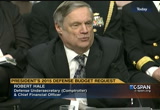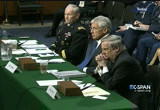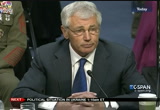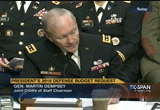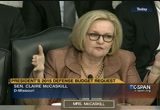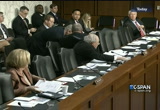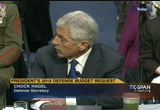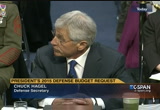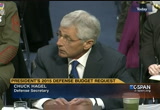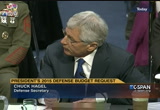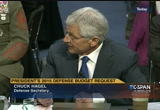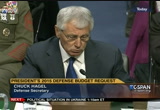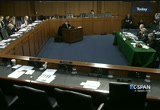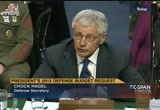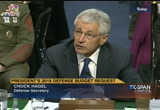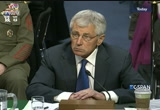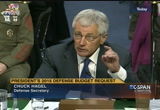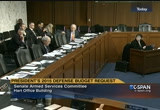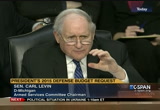tv Key Capitol Hill Hearings CSPAN March 5, 2014 11:00pm-1:01am EST
11:00 pm
that is the priority. have come up with a set of recommendations. we slow the growth of increases. i have laid out some of the specifics of that. we did not do this unilaterally, i took recommendations as the secretary of defense from the chief and the secretary and dempsey. i know we cannot continue to sustain the kind of growth we are on and still make certain that our men and women will be ready, are ready and equipped and especially in light of a number of whites made here earlier this morning about emerging threats and merging technologies. some of our adversaries are developing pretty significant capabilities and technologies that we have to stay ahead of.
11:01 pm
that is part of the balance. we did look at everything. >> the reason we need to move now is the budget caps are in place now. we have the information to go forward and if we do not, we will have to cut training and maintenance and we do not want to do that. >> i thank all of you. you mentioned the emerging threat. the committee is clear on what they need to do. all of you take the best interest of our men and women who are serving at heart. i know you have a lot on your plate today. thank you. >> thank you. ayotte.a at -- kelly >> and want to thank our redness is during challenging times for our country. i wanted to follow-up on some of the remarks that senator chambliss made. i am he -- glad to hear how you
11:02 pm
yourself were actually assisted an a-10. that story can be told many times especially by those who serve on the ground in behalf of our nation and our army, general and described the a-10 as the best support. it has performed incredibly well and our soldiers have confidence in the system. i wanted to ask you this is not the first time that in the past even before the performances we and anen from the a-10 iraqi and afghanistan that the air force has tried to eliminate this platform. >> no. >> we have been here before and some of the biggest advocates for the platform have been -- your fellow soldiers who have had similar experiences with the 810, isn't that right?
11:03 pm
>> absolutely. i said this before and i will say it again. i will tell you what is different now as we had some slack in our budget over the last 10 years. there is no more slack. the margins are just really very tight. theif you're asking me, a-10 is the ugliest, most beautiful aircraft on the planet. lex i appreciate that. let's talk about the slack. i understand the difficulties that you are under in terms of the budget challenges. it seems to me as we talk about values and priorities, the biggest values and priorities that i know we all share is to that the men and women in uniform have the best support in protection they need. let me say that i agree with senator chambliss said. that the a-10 is not a single purpose airplane. is's talk about what we know
11:04 pm
it's very important purpose. as i understand it recently in an article, air force officials and knowledge to win this article does cost the elimination of the a-10, getting rid of the a-10 could lead to higher depths, longer battles, even defeat on the battlefield. this is from air force officials and major general paul t johnson, the air force director of operational acquirement said the risk is higher than it should be. that is a clever way of saying more people will get hurt and i and extreme risk is that you might not win. here is my concern to all of you in question. i understand the budget environment but we are in these proposal this is your is to eliminate and phase out the f10 before even we have an f perform close air
11:05 pm
support and will not be operational until 2021. you have it phased out by the 19. we have that gap there. thingsthis of all the that we talk about fire days, when we hear -- priorities, when we hear air force and i have heard similar concerns, that lives will be at stake, while we not preserving that priority over other priorities? >> because i do not want to leave it hanging in the air that i would take a decision or supported decision that would put our men and women at greater risk, i would not. 's --u know, support can be .e provided >> i do not think you would disagree that the re-attack times are different.
11:06 pm
so therefore if you are talking about one or two minutes that could be the difference between life and death on the ground. i understand that other be parts can certainly of this mission but the question is, is it worth that time for our men and women in uniform on a platform that has performed consistently well? the other concern i have is that it seems almost like an assumption that we are not going to fight another ground war. you do not share that assumption, i hope. forward think we can go with that kind of assumption. >> i do not share that view at all. to would be fortunate enough have the chief staff of the air force appear before you who happens to be an a-10 pilot. >> i hope he thinks back to hits -- his roots. a let me ask you about the
11:07 pm
priorities of where we are with regard to defense pending right now. just your concern you hear echoed across this committee, as i look at the president -- i also serve on the budget committee, the president proposed budget and fiscal year 15, thinking about the threats we face around the world right now and obviously, i know all of you have laid out in your testimony that this is a very dangerous time around the world with the threats that we face. actuallydent's budget proposes in the fiscal year 15 .9% reduction in defense. -- 3.4% increase in nondefense spending. as we look at this in terms of this threat we face around the world that unfortunately we are not meeting as we look at the threats and the foremost responsibility to defend the nation as the ultimate prior it he that ensures that we can do
11:08 pm
and preserve everything else including our freedom. and the other thing i wanted to get your commentary on is if you look at what we spent on defense historically between 1946 and 2014 we spent roughly six percent of our gdp on defense spending area where we are headed based on the president's inposed budget is that fiscal year 2014, a goes down to 3.4% of gdp and as we go forward with this budget proposal, by 2024, we're down to 2.3% of gdp on defense. will that be different -- sufficient to defend this nation? >> let me go back to a couple of points i made earlier. the president is requesting a 150 doubt -- $115
11:09 pm
million request. the defenset puts of this country as its highest priority. he knows that is his highest responsibility. he knows that he is responsibility -- has responsibility to fund the national security interests and carry out security measures. i think the numbers are somewhat reflective of that commitment. i think if you go back to my i will let the comptroller respond to this if it is ok. the budget that this president has presented, they have been above would have been eventually the ultimate number that we receive. i do not think there is question about this president -- >> if the president's number one priority is protecting the
11:10 pm
decreasehy is it a 1% for nondefense spending question mark that shows me where the priorities are. number one priority is defending this nation, his budget does not seem to reflect that priority. >> aren't you on the budget committee? that is the questionnaire. >> i will ask it. thank you. >> just to clarify one number. more that islion requested is on top of the $26 billion in year one. >> that is correct. >> it is a four-year figure. five-year. thank you. >> thank you. all very much for your
11:11 pm
service and for being here this morning. i would like to begin by echoing some of the concerns that many of my colleagues have already expressed that you all talked about in your testimony with respect to the provocative actions in the ukraine by russia and the challenges that means for us here in the u.s. and for the international community. i certainly hope that we will see action in the senate and congress in the next few days. thatast in the next week expressed bipartisan concern and send a strong message that the country is united and we thank those -- think those actions are totally inappropriate and unacceptable within the international community and international law. i hope that you all will continue to keep the committee informed about that issue in the
11:12 pm
coming weeks as challenges change and things are changing very rapidly. outlined in many of the questions so far, people have talked about the increasing threats around the world, the significant crises we are facing throughout the world today and the challenges that face is for our national security. thetly is about men and women in uniform and int is happening elastically terms of our military and its footprint in the united states. i represent the state that shares the shipyard. that is the big issue for us.
11:13 pm
as i saw the budget that is being presented, one concerned that i had was that there is a request for another background in the future as chair of the readiness subcommittee and senator kelly ayotte is my ranking member. we are very concerned about that. i certainly strongly disagree or a coupleee and i think of things we need answers to, one is last year at our readiness subcommittee i asked about the timeline for the delivery of a report on our installation and europe with respect to our infrastructure there. a sensitivehat is
11:14 pm
issue right now. it seems to me if we are making base closurest here in the united states we need to have a picture worldwide about what we are facing and europe is part of that picture. secondly i do not think we have heard adequately about the cost of another background and how that would impact on our ability to save money over time. we know that the last round costs about $14 billion more than was anticipated. there have been a number of recommendations for how to do this in the future that have not yet been adopted idea d. speak toif you could that concern and to the potential for us to be able to see a report on what is happening with our other infrastructure around the world, particularly in europe. >> thank you. first, since 2000, i think down
11:15 pm
the road on our facilities closing in europe by over 30% of where we started from. we can get you the specific numbers. we are accurate in that. this committee david the dod some pretty clear direction on that. we are complying with that and we are continuing to explore all the options everywhere particularly in europe. we will give you the specific numbers. on two or three of the other points you made on the cost, i presume you're talking about the 2005 base closing. which as you know the focus on that and chairman levin knows this very well was as much a is anythingon as else. we are generating considerable
11:16 pm
from based we will closings. it is around $12 billion, is that a year? i think the year-end savings which we can document and we can show you that. the fact is bottom line, we tonot continue to afford carry infrastructure that we do not need. i wish we could do it all. i wish we could keep every platform we have everywhere. but we cannot do it all. it does not make sense taking money away from infrastructure that we do not need that is not relevant. it takes money away from what is relevant. our people and otterness nation and our readiness. we think this is a smart position to have. called for we have it again. we will continue to work through all this. i have got some options as secretary of defense.
11:17 pm
and through a section of article 10 of reorganization and so on. we have to come at this like i said and the chairman said from the beginning with a complete understanding of what our needs for the security of this country are and going to be and the requirements in order to fulfill our missions to secure this nation and our interests around the world. that is how we are coming at it. >> i agree. that is why i hope we will see the report on the european infrastructure consolidation because i think that is information that will be helpful to this committee. >> i will ask for comptroller fee wants to add anything. >> another round would be different. it would be ended saving money and cost based on historical precedents about $6 billion. $2 billion a year in perpetuity. if we do not do that we are basically wasting $2 billion year. we need your help on this one.
11:18 pm
>> do you have information on when we might expect a report on the european and for structure? >> i do not know the exact a. we need to do both. we cut a lot of europe and we will continue to as it is appropriate but we know we have domestic infrastructure that is not needed. we need to go after votes. i do not want to see us wasting money. it wouldeciate that. be helpful for us to have that information so we can help work with you. >> we will get you a date for the record. >> thank you. >> thank you very much. senator fisher. >> thank you. i thank the witnesses for being here today. first of all i would like to say that i appreciate your comments that you made last month with regards to modernizing our nuclear capabilities and also with your attention you have given the issues that we have
11:19 pm
with icbms. i do thank you for that and for prioritizing those. and the president speech in berlin last year, he'll and the door to additional reductions in nuclear forces. since that time we have heard numerous testimony and we have heard that from commanders that further reductions should only come as part of a negotiated agreement with russia. is that your view? x yes. >> general dempsey, do you agree? >> i do. >> the russians, they are not interested in further reductions at this time, is that true as well? there are not any further conversations on this issue. as far as i know. >> do you also agree with that? >> i do. about orare talking
11:20 pm
any additional reductions, whether it is going to be warheads or launchers, that is kind of premature, would you say, it is not practical at this time. >> we continue to work to comply with as the russians do with the new start treaty. that is our focus and that is what we are continuing to do. >> would you agree with that, general dempsey? you're saying that any reductions in those warheads or launchers, and he additional reductions are premature. >> beyond the new start treaty, yes. >> thank you. for last week you announced structure changes. if you can imagine a lot of us have heard about it and we have heard about it not just from
11:21 pm
active military and reserved but also our national guard members. our governors were here last week or the week before as well. when i have heard was the perception out there that possibly the guard really was not engaged and how this decision was made. can he speak to that for us? >> yes. i met with the governor's counsel when they were in town as you may know. our senior representatives spent most of the day with the governors and their staff. that is first. i had lunch with nebraska's governor. we talked about these issues as well. priority of the national forceand reserves in our
11:22 pm
structure posture remains a critical part of this is i have already noted. we are planning for that. as you know the national guard as chiefepresentative who sits at the table. the chairman of the joint chiefs convenes those meetings. the active participation and voice of the national guard is very clearly heard on all matters. general frank has been an important addition to all these issues and recognizing he represents the national guard and we get that. there is no leaving out the national guard on any decision. recognizing there were differences ultimately. make no mistake. the priority of the national
11:23 pm
future isd reserves critical to the interest of this country. >> i can reassure my guarded home that their views were heard, it was a collaborative postal. doing a veryass is effective job representing you. >> thank you. >> back to the ukraine. everyone here has deep concerns with the situation. what our goals are, what the goals are for the united states, what is our priority, is our priority to return the crimea to ukraine and how will we -- addressing what the priorities are for our country with regard to what is happening there? >> our objective is the president has laid out and i think as you know what secretary kerry is doing is to de-escalate the tension, the crisis.
11:24 pm
so that i give us -- that gives us an environment where we can work through the current situation. as i noted in my opening comments a number of diplomatic economic tracts are now in play. -- president issued initiated those with our european partners with the u.n. osc and nato and the budapest partners that's -- that signed .he budapest agreement secretary kerry was supposed to meet with the minister today. whether that has happened or not. these different tracks, it diplomatic, economic solve this problem diplomatically. we have interests them of course we do. ask.is the goal as you what are we pursuing and what are we doing? i think it is the right approach
11:25 pm
. the responsible approach. that's what you say our goal is tode-escalate tensions over see the russians removed from crimea? >> we made that clear, our position. we are -- we recognize the new government. the russians, they have a basing agreement with crimea. troops should return to their barracks. there is a threshold of how many troops they can have in the crimea. de-escalated be and tensions are down and the troops go back to their base. the government is allowed to govern and prepare for the elections that are set in may. that is the right approach. the integrity, the sovereignty of ukraine has been violated.
11:26 pm
we made that very clear. that is the issue and will be the issue until that is resolved. call on senator kelly ayotte. >> thank you. received the wrong #protected the president's priorities because there was an increase in defense -- nondefense spending versus defense spending with regard to 14 -- 14 to 15, that is not correct. it is there a verse. there is a one percent reduction for defense and to 3.4 reduction for non-defense. to the sick just -- the extent i suggested their priorities were anyrsed and encourage and
11:27 pm
impression that was given by that. >> let me begin by joining my colleagues and thanking you, mr. secretary, general dempsey, and mr. hale for your extraordinary service and your focus on this -- the strategic priorities which i believe are the right ones for this nation. on example, for the need additional submarines at the rate of two per year in production, for the focus on air superiority and the joint strike fighter, and the concentration of the needs to keep the national guard and reservists strong. man whoo focus on one happens to be a resident of connecticut. who enlisted in the u.s. marine thes in november of 1968 at
11:28 pm
age of 20. went to paris island and served untiltnam from july november of 1969 where he was brushed by mortar fire and gassed, by guerrillas, subject to rifle fire, he received a high proficiency rating for his conduct and performance on the field, and some months after leaving vietnam, began to suffer from anxiety attacks, flashbacks, insomnia, symptoms that we now know are associated with poster manic stress. posttraumatic stress was not even diagnosed until 1980. he was involved in altercations, other incidents that led to his
11:29 pm
confinement to the brig and he was even the choice to leave the military within other than honorable discharge. and he chose to do so. in that year, when he received that discharge, his condition was unrecognized but now would be recognized as such thanks to the changes in policy and i commend them and i know that you have read extramarital -- you have been instrumental in achieving them. there are thousands, we do not know how many men who were discharged with other than honorable status and have suffered the stigma and shame and loss of benefits and wounded twice, first on the battlefield and then in civilian life first
11:30 pm
and thenaumatic stress by an other than honorable discharge which denied the medical treatment for the very wounds that they suffered as well as employment benefits, housing, other ba benefits -- va benefits. mr. monk hasunt, sued you and your colleagues as did john sheppard before him. hope this can be avoided. you are very forthcoming in the confirmation hearing. and agreed to review this situation. i am asking you now to commit to changing the system because mr. monk has waited for 18 months for the board of corrections of
11:31 pm
naval records, the board of corrections has not dealt with his application. he has begun a class action on behalf of himself, other organization, and veterans. the system really needs to be changed and overhauled. i would like your commitment that you will address this situation as soon as possible. i supported you because of my confidence that you cared about veterans such as mr. monk and the v.a. is sympathetic and supportive of the situation but discharge.ge his that is solely within your power and i am confident in your commitment to our veterans and our troops. i continue to have tremendous aspect and admiration for your record of service and your commitment to them. this comment on my part is not
11:32 pm
by way of criticism. i know you have a lot of things on your mind and it has been a to z year but i am looking -- asking for your commitment now. >> thank you and thank you for your generous comments. you have my absolute commitment. i asked our general counsel yesterday about this lawsuit. i assume you are referring to the larger vietnam veterans of america. >> exactly. >> i took note of it. i asked our general counsel to get back to me this week on it. i will get into it. get the specifics and our staff will get the specifics. the already addressing larger issue and taking a look at it and i will do it personally. thank you.
11:33 pm
let me briefly deal with the interoperability of the medical like -- electronic records. could you update me as to what can be done as soon as possible not only to make the system interoperable but also to in effect integrate it and make it seamless and truly serve the medical interests of our veterans as well as our active-duty members. went you may know when i to the pentagon a year ago, this was a high priority. systemuctured the entire within dod. we were not making progress -- we should have been making progress. we all spent a lot of money on this.
11:34 pm
put it under the direction of the undersecretary and requisitions we brought in a new team a few months ago. that team has been briefing the help constantly. we have gone out to the private sector on rfp's and we are going to happen interoperable situation. dod -- thisnell at is aside from this particular project. thist dod her snell out in aid of washington out -- assigned out there. closely on this. we are going to get there, that is the goal. we will attain that. we will be putting that rfp out in the next couple of months.
11:35 pm
had three different industry meetings. response and we want to make sure that we haven't and are operable system. we have computerized the health care records. we have some other things that we need to do with it as well. if your staff would like a specific briefing on this we can do that. >> i was going to ask you if that would be possible and i would appreciate it. i would like to say when the council contacts me about the vietnam veteran ptsd situation. i am not asking about only mr. monk, i am asking about the literally thousands of others who suffer from condition that was undiagnosed until 1980 and
11:36 pm
many suffer the shame and stigma of the other than honorable discharge. .hey can be corrected item, it is at critical item. would you let the committee know and i will share that with the members of the committee. they touched an issue which is very significant and that strikes a chord with all of us. >> thank you for your service. we will try to get through a lot of ground here. releasednees that were by the karzai government, i want
11:37 pm
to thank general dempsey and secretary hagel for speaking out strongly. i know you have been intimately involved in this issue. congress spoke on this issue about the issue. i appreciate your leadership as i have told you. as i have said publicly. the voice of congress would be important because this is a huge threat to our people. ini worry about more to come the last hours of the karzai administration. we have a bipartisan resolution. i would like to urge my asleagues to get that passed soon as possible. i want to thank you both there. sequestration was not your idea,
11:38 pm
was it? >> that the record show. >> not -- nor was it yours. >> it was not. >> whatever differences we may have a problem we are discussing was created by the congress and the white house. .lease do not misunderstand the military has never suggested this road map we set out for them. it was part of a supercommittee and punishment clause and here we are. i want to let everyone know that you did not create this problem. you're going to help us solve it. when it comes to reforming this is a must no matter how much money you have in the budget. >> there are some things they should do. sequestration aside and that is one of them. i want to be generous to our military men and women.
11:39 pm
it is on the path of being unsustainable. rex if we can slow the growth we can spend the money where he needed. it was a couple of years ago, you did allow some modest increases. >> it has not changed much. >> i want to compliment you for putting these tough issues on the table. i hope that congress will back you up as to how we sit down and look at future retire -- retirement and benefits. that needs to be put on the table. that is why i am waiting on the commission. tommy and in reforming the military, count me out when it comes to cutting the military. with an understanding i would like to talk about our budget. of gdp are wee
11:40 pm
spending on our national defense in this budget? be 3.2% for dod. >> historically in times of peace, is that low or high? >> it depends on what history you are looking at. if you go back it is a lot higher. it was higher in the past. >> apples to apples. it has been well over five. do you consider this a time of peace? >> it would be hard to describe it that way. , 3.2% is below what we would spend on military and time of peace. we will see if we can recognize -- reconcile that. let's talk about the ongoing conflict. have you talked with anyone in ukraine on the military side
11:41 pm
that would indicate that if russia continues to advance and there is a military conflict if they moved eastward toward kiev that they would request our moments from nato? >> i have not spoken with anyone who has suggested that. that putin moves forward toward kiev. the on the crimea. would you support providing arms to the ukraine if they ask nato? >> if it is a nato decision as you know that would take all 28 would depend on the circumstances. you know the nato relationship. we support that unilaterally. to provide them armaments and >> as russia marches toward kiev. that would be a presidential decision. he would make that decision.
11:42 pm
>> i want russia to know that we are not going to sit on the sidelines forever here. if they have an escalation plan in their thinking i would like them to know what comes their way. any american boots on the ground. that is something we need to think about as a nation. when it comes to 420 or 440,000 people in the army, what percentage of that would be trigger pullers, people knocking on doors and shooting people? >> the chief would appear before you and one of his reforms is to rebalance. the other way to answer that question is the army is -- provides a lot of capability to the joint force. a lot of enablers and logistics.
11:43 pm
you can count on one third of it being deployed. if we decided to have 500,000 people in our standing army and 360,000 people in the guard, would that be an irresponsible decision, would we be throwing money away given the threats we have? back andd have to go do the kind of analysis we have done. >> the point to be that the analysis of numbers is budget driven, not threats. you are living in a budget confine. you are coming up with numbers to do the best you can with the money you have got. i am asking you if the country wanted a 500,000 person army with that be a waste of money to get -- if you had all the money in the world to spend, is that too much? >> and i react to the characterization of this as being budget driven. we have -- we would have accepted the levels of -- and
11:44 pm
build the budget accordingly. we can provide security needs at a higher level. whether we would go higher again , i would have to do the analytics and figure out what to do about it. >> i think the chairman is right. that is what we would have to determine. >> would you like to have a 500,000 man army to defend the nation? >> i hope you did not call me secretary. >> what i would like is budget certainty in the flexibility. i will show you what that does and then ask you. 10 of the sequestration, our national security spending on defense is three percent or less of gdp thating on defense, one is
11:45 pm
-- what kind of risk with that entail? think the way we have to answer that or analyze an answer had, aswould be as we we have prepared. what do we need, what are we required to defend the national interests to protect this country. does that come in at four percent or 3.5% or 3.2. that is where you start. then you match what those resources would be in order to accomplish the mission. >> would you send me a statement doing that? i want you to do that exercise. three percent is the amount of money you will have.
11:46 pm
>> for how long? for certainty of 20 years? rex yes. >> while you're thinking of an answer to that -- >> we can run models. that would be great. the boat has started and we will run and vote. over to thern this next senator who is here on this list that will be given to you and then we will keep going from there and if there is no senator back from voting, we will take a short recess. >> thank you. thank you for all your service. in regards to the bsa in afghanistan. becomes a time when it
11:47 pm
unworkable to do it, is there in like july, date august were you look up and we still have nothing and you say we are -- the sand is out of the hourglass? the president has options, ranges of options, the scope of options which we have provided. you know what the range of those options are. the chairman noted earlier. a were required to do counterterrorism mission. day, what is the cutoff date? general dunford and his leaders have framed the general time frame on this. had to look at that general
11:48 pm
time frame for the reasons you mentioned. if we do not have a bsa which the president made clear, we have -- outhat i am trying to find and i am kind of familiar about the timeframe. when you are looking up september 15, do you have time to get this done? >> we are in a condition of low risk right now. our retrograde is going on pace. the risk you have of having retrograde be affected is low. by the minute -- the middle of summary goes to low and then high. nowhat is your assessment go, weability once we have trainers left. in place.is put
11:49 pm
are we continuing to stay on the metrics as we had planned out to december 14 and your thoughts as to how they do once we are gone? >> tactically they are capable today of sustaining the fight against those who are fighting them. institutionally that is to say how they budget. how they resupply and how they procure. they're nowhere near being ready to do that on their own. that is the level we need to focus not only the time remaining to us but in the time beyond the end of 14. >> we have seen a pickup in suicides in the army reserve and the guards down and actives but up again there. putadditional focus you can on this would be extraordinarily if you need more
11:50 pm
, let uss in this area know. if this is a resource challenge for you as well financially. challenges fora active, you have done such extraordinary leadership jobs, anything we can do to try to lift this burden off would be very important. you have all the resources you need in that area right now? >> i think we do, sir. generally because we have made the effort to place them there. it requires constant recalibration. picks up we have to understand why. ukraine andook at our nato allies.
11:51 pm
how is coordination going with our nato allies and allies there? >> i think the european allies understand this threat rather clearly. the president has been very clear about our support for the people of ukraine, their independence, the independence integrity oft -- their sovereignty. secretary clear -- kerry was clear. let the people of ukraine decide their future. also in collaboration with the european allies as well as others, particularly the osce a $15eir announcement of billion commitment they have made. secretary kerry noted a $1 billion u.s. commitment. i hope the congress would move
11:52 pm
on that. with some dispatch. the imf is looking at different options so all of our allies and particularly the europeans are all part of this effort. the hold diplomatic -- whole different my -- diplomatic track. clear in active participation with our allies. >> this is critically important and we appreciate that very much. senator lee is next. >> thanks for your service on our country. secretary hagel. the administration has yet to oaca request.
11:53 pm
make specificto the work [indiscernible] the spectrum, there might be 10,000 troops remaining after their withdrawal. others suggest it might be closer to zero. even at the higher end of these say ates, if it were let the 10,000 range, this would still represent nearly a 2/3 decrease in our presence in afghanistan next year. expect in light of that to see a corresponding decrease in the request for next year? you for your question. i will ask the comptroller to answer the specifics. , thepart of the budget
11:54 pm
overseas contingency part of the budget has many things in it. there are readiness issues and so on. it is not just afghanistan as you know. obviously we are waiting to see if we get better clarity on what might be. post 2014 let me ask the comptroller to go deeper. >> a decrease but not proportional. as secretary hagel said there are items in there that will not come down and proportional -- in proportion to boots on the ground. national security forces are possibilities and there are others as well. i'm not prepared to give you a number. it will come down but i would not expect it to be proportional. pre-k's ok. you have outlined some very specific reductions in and strength. within the army, it's reserve
11:55 pm
units, and within the marine corps. you are a little less specific on your reductions to department of defense civilian employees and civilian contractors. can you give us an update on your plan to cut 20% of major headquarters operating budget and other ways of making cuts in civilian personnel? detailed give you very progress report. which we can give your staff briefing on. as you know, general dempsey and effort for all headquarters across the world. joint service combatant command starting with my office.
11:56 pm
that plan is underway. that plan is progressing. we are continuing to follow it out and the specifics of it, i will be glad to give you more detailed -- a more detailed report. >> i appreciate that. we will come down about five percent. we need your help here and the c.y to cut civilians is bra you -- if we are going to see sustained reductions we need your help in allowing us to close unneeded infrastructure. >> thank you. action by russia in crimea is alarming. ofis part of a series disappointments we have seen since the russian reset between the syrian crisis, the situation
11:57 pm
with edward snowden, the repeated inf violations by russia and now we have the situation in ukraine. we had a disappointing series of setbacks with russia as it relates to our relationship with russia. about to talk to you energy policy and how this might factor into that. it is of concern to me that some of the countries including many of the democracies in many parts of the world that should be more inclined to stand up to russia or -- are perhaps not in a position to do so because of the fact they are heavily dependent on russia for their energy needs given their dependents on russian produced oil and natural gas. that you think that it would be in the national security interest of the united states to open up our domestic production of oil and natural
11:58 pm
for purposeslly related to our national security? such that if we could open up our own production of oil and natural gas and make sure that we are able to export those commodities to a significant degree in the international russia the government in , the plutocracy in russia that this dependents on russian oil and natural gas, with that ameliorate this problem? >> the short-term crisis that we are dealing with is probably not with to be ameliorated that dimension. however, your larger point is an important one. about energy and production of energy. it is not insignificant that north america is going to be
11:59 pm
essentially as we fulfill the capabilities of our technology -- it is the number one producer of energy and what kind of leverage does it give us or not give us. markets and economics always dictate different dynamics of any foreign policy equation. >> finally in light of the deterioration of our relationship with russia as i have just described, will the u.s. continued to pursue a new nuclear weapons treaty with russia as the president outlined in his speech in berlin last june? are pursuinge compliance with the new start treaty. there is no new treaty.
12:00 am
we've been do it in conjunction as we have had. >> recent events give a certain pause? you always start with the ronald reagan theme of trust and verify. that is why you have verification procedures in place for all of these treaties. >> i understand and i would add only that given their failure to comply with the agreements we've got, i have significant concerns about that. thank you to the witnesses for being here. energy position
12:01 am
gives us a significant contemplate u.s. sale of natural gas to the six nations to whom we give waivers that need to buy oil from iran. our natural gas gives us the ability to wean away those countries from reliance on it -- on iran. the nations who feel constrained because they do not have other sources, we would have an enormous opportunity. i want to make a point and this ,s really for the comptroller as i read the testimony about the president's budget, you are sequester,ief from but not full illumination of sequester. -- elimination of sequester. if we do exactly what you are asking and we combined that with
12:02 am
the earlier sequester relief, you still will be absorbing 54% of the sequester cuts that were imposed pursuant to august 2011. while you think any sequester is even in your presidential budget submission ?oday, and my and the ballpark -- am i in the ballpark? what you are in the general ballpark. there have been cuts. >> we will ask a question for the record to specify what cuts the dod has absorbed even if the desired state of affairs occurs. with respect to carriers, your
12:03 am
says the on page six presidents budget plan enables us to support 11 carrier strike groups including that uss george washington. before i get into some particulars, it is the position of both the dod and the white house to continue to support and 11 carrier navy? >> yes, it is. >> that is not just a policy position of the white house, it is also a statutory requirement. it is a congressional statutory requirement as well. any reduction of the carrier force from 11 to 10 would not just be a matter of the budget line item, but it would require a change in the statutory? testimony,opening you testified that if the
12:04 am
enacted,'s budget is the george washington will be mark iled question looked at the budget when i received it to determine how the budget of 15-16 accomplished that. as the chairman indicated, i was a bit confused by that. the same could be said about marineorce, army -- force, army, the carrier issues. i would be confused if the president's budget is enacted, would those priorities he funded? -- be funded? enactmentexplain the of the budget will make sure those requirements will be accomplished? >> i will ask the comptroller to go into the more detailed
12:05 am
explanation, but as i explained , thee chairman earlier , we in those decisions planned for what the current law is, sequestration. i have sent directed to the chief saying, if we get an indication, which we hope we will, that sequestration will 2016,ntinue picking up in we have time to plan. we do not have to make that decision right now. people are associated with this particular issue. we have time to make those adjustments.
12:06 am
i understand the confusion on how we -- why we did it and how we did it. bobme stop there and ask for further clarification. >> what we did is not a disconnect, it is prudent planning. the law of the land is sequestration. we do not know what the congress is going to do. what we have done for those force elements where we need time to plan, we have put the sequester goal in the out years of our five-year plan, but we , if the congress gives an indication they will level, we will start -- we will stop the drawdown of the army and we will keep the carriers at 11 and we will make the changes we have to to accommodate that. follow-upsk a
12:07 am
specifically on the record. the unequivocal commitment is an important one. we want that commitment to be an unequivocal one. >> we have to have some indication from the congress that you are going to appropriated. >> if there is an indication from congress, we will do something different. we just did a two-year budget to give you guys more certainty and to give the private sector more certainty. just try to give you more certainty for 14 and 15, including sequester relief. you are asking us for some additional certainty for the out years when it is not the current intent of the senate to do a different budget. your indication, give us an indication, i am wondering what kind of indication would be
12:08 am
sufficient given that we have just done a budget with the last few months. senator, i get everything you said and i ask the same questions. back to what the comptroller said. i cannot commit carriers come for structures, when the law does not allow me to do that in the current numbers. flexibilityild some into this. like every hard choice we have , if theforward structure we have, the program we have, the ideas and plans we
12:09 am
have, in the balance for the next five years. if we do not have those numbers to keep the carrier and to keep the structure, we will have to take it somewhere else. maybe the decision and is to do that. it is imperfect. we have never been this way ever before. i havet think -- certainly never seen such a time of unpredictability, not just in the world, but in budgets, resources. in an enterprise the size of the pentagon, it is an imperfect set of dynamics and we are trying to plan in a responsible way. time.m over on my
12:10 am
>> thank you, mr. chairman. a number of other folks, i am really concerned that the qdr iscutie are -- budget driven. i do not think it is supposed to see -- supposed to be. it is supposed to be fundamentally different. only designeddr to look out five years? isn't the mandated norm 20 years? i would be happy -- >> it is. that, there is projections for the future. i would also say -- they is my understanding are not clear 20 year projections. >> that it's pretty hard to do,
12:11 am
senator. >> is and that required by law? -- isn't that required by law? >> we have done that, though we did not do it in the same specificity that we did a five-year look. i do not know of anybody who knows what the world will look like. we wanted to comply with the law . it was not budget driven. it was budget informed. soon after i went to the pentagon a year ago, i directed a strategic choices management review which built a whole set of prodigies. it is not -- the reality is the strategy is only as good as the resources it implements.
12:12 am
>> can you -- how does the qdr fill the mandate? it is very different. --i will be happy to provide >> you do agree that that is the legal requirement? >> we complied with the law. >> if you could outline how you did it. done in an environment that is bit -- in a bit of an aberration. it is a long-term project not an overt night -- an overnight
12:13 am
affair. it used the defense strategic guidance as a foundation document and build upon it, but the themes, the principles, the mission refer back to the strategic guidance. or is a coherence here -- there is a coherence here. what do you think this -- >> do you think this qdr offers low to moderate risk? >> if we achieve the promises withare in the qdr institutional reform in all of the things that come with that, .e can lower the risk it will take some heavy lift thing. >> we are not there yet and we .eed to get those exactly right
12:14 am
>> general, i assume you agree. level wes the lowest can maintain reasonably in the army. ago, wer three years were asked by this body, where does the risk become too high? where is the floor? each service what about the task of trying to answer that question. >> do you think going below that impose greater than moderate risk? >> in certain mission areas. it would not affect our responsiveness in the maritime domain and cyber, but it would
12:15 am
on langreater risk domain. >> iran may soon be -- may still be capable of fielding a missile that could hit the u.s. by 2015. what we have built in to this submission to deal with that possibility? as you know in looking over the general numbers, we have added to our modernization of ballistic missile defense, we announced last year that we would build additional interceptors. , we aredding to cyber adding to defense of the homeland.
12:16 am
we are working with the european -- andand our european our missile defense there. we are addressing those vulnerabilities. >> let me ask you a little bit differently. in 2015 isitting us a possibility. if we determined it was a probability or a near certainty, would we need to do something additional to maintain moderate to low risk in that category? probability or a near certainty, would we need to do something >> you are always assessing risk and threats and the capability to respond and stay ahead of .hose threats >> if we determined that was really going to happen to him and not just the possibility, is
12:17 am
there enough in this plan and in this budget to face that with moderate to low risk? would you want to be doing something additional? >> we may do something additionally, but this is the timeframe on where we think the threats are. it very much -- >> we believe as missile defense program it is articulated in our strategy and captured in terms of resources in the budget come a is adequate -- budget, is adequate to the challenge we face. if they broke out in a way that was unexpected to us, edges always a possibility, we would have to go back and take a look at it again. >> what i am hearing if you
12:18 am
think we are covered if they achieve that capability? something more aggressive would have you to go look back? >> that is right. thank you, mr. chairman. dempsey, i believe you stated you had been speaking to your russian counterpart about crimea, is that correct? >> about crimea and about ukraine in general. >> secretary hagel, have you had conversation with the russian defense ministry with regard to crimea and ukraine? >> yes. , no oneussian position
12:19 am
in the world believes it, but the russian position is that these are not russian troops. do either of these gentlemen speculate as to who these forces belong to? did you ask this question? who the russian leadership says these people belong to? senator, and the answer was they were not regular forces. they were well-trained militia forces responding to threats to ethnic russians. >> and well supplied, no doubt. >> i did suggest that a soldier looks like a soldier looks like a soldier. that distinction had been lost on the international community. general,u tell us, based on our best information, where these troops came from?
12:20 am
>> i cannot at this time tell you where the military forces inside of the crimea came from. we have been tracking other activities in the western and southern military districts, but let me roll back with the intel community. secretary hagel, can you enlarge on that question mark >> the chairman said it all. >> it is not that you cannot tell us in this setting, it is right now you just don't know. >> tell us what? >> where these troops came from. >> do the specific russian divisions? i do not know the specific areas. >> the international community
12:21 am
is watching, secretary hagel, other than just absolute logic, what evidence can you give to this committee and to the thatal listening public these are russian troops? >> i am not contesting that. >> the russians are contesting it and i would like for you to tell for the record what as thetion we have united states military and as the dod that contradicts the russian position on this. >> we can get that information for you. >> we are pretty clear they are russian troops. >> i think it is clear, but what
12:22 am
evidence do we have? >> we do not have any evidence as yet. evidence could become available over time. if you're asking my military judgment is that these are soldiers who have been taken at of their traditional uniforms and repurposed for placement in the crimea as a militia force. , we are notnd verse quite ready to cite chapter and verse how we know this for a fact. >> that is correct. >> i hear some talking heads in the media. trying to make a distinction between crimea and eastern ukraine and it is disturbing to me. i will let you respond. it is disturbing to me to hear some people suggest that crimea
12:23 am
is a semi autonomous part of from thend it is gone ukrainian republic and the russians will have it. i think that is not acceptable position for the united states to take. you agree, general dempsey? >> the 1994 agreement when ukraine turned over its nuclear weapons guaranteed its sovereignty. as part of the territorial integrity, and could crimea. -- included crimea. >> it will be our firm position as the united states position that russia needs to withdraw its troops and crimea is part of ukraine and that issue is not up for debate. >> as you know, russia has a basing rights agreement with
12:24 am
ukraine and crimea. -- in crimea. the president has been pretty clear on our position that the sovereign integrity of a sovereign nation has been violated. >> russia has a base there and they are entitled to the rights given to them under the ukraine andtween russia. that does not give them any right whatsoever to occupy that part of the crimean peninsula. am i correct? >> that is right. >> gel dempsey, -- general dempsey, we've had some information about the russians violating the imf treaty.
12:25 am
you were not chairman in 2010, but if you had been aware of any potential russian violations of the treaty during consideration of new start, you would have recommended that the information be briefed to the senate, would you not? >> i think i would've made a recommendation that it be briefed in a closed classified setting. the sources and methods of intelligence are fairly significant, but i would've recommended that all available information be made available to the decision-makers. >> when did you become aware of this violation? >> i am aware of the allegation of the violation and i'm aware the report will be submitted next month. i have not seen the report as of yet. >> thank you for your service.
12:26 am
you.ank i know people have talked about you, secretary, and i thought of you several times over the previous weeks when there been of beingo accused me soft on the sexual assault matter because i'm soft on the military. we have had some difficult exchanges over accountability in the military. i want you to talk about the audit. i was taken aback once the .arines -- it took five years when the marines say they are ready, you kind of assumed they are ready. for that audit to have taken five years and multiple audits for them to get a clean opinion,
12:27 am
i am a little worried that the rest of dod understands what audit readiness means and i want to make sure we don't waste time or money chasing this prematurely when the basics have not been done. the you have a sense -- do you they are being addressed by the other branches as we prepare to roll out a declaration of audit readiness? >> yes, i think so. we learned a lot from the marine corps. i want to be upfront with you, we will not get a clean opinion the first year that we -- first year. the auditors need to get comfortable with us and learn our business and we need to learn from them. we need to get this department -- we will learn so much more than if we continue simply trying to do it within the department.
12:28 am
i believe there is a gray area, but if we are in that gray area where we think we're are close enough, we ought to get going. would bee me, i astounded and worried about the auditors if you got a clean opinion in one year. thank you so much for your years of service. . am very grateful the folks with uniforms on and especially people who do what you do, it is not the glamorous job at the pentagon. you should get a lot of credit for the time and energy you have spent. afghanistan.out i am worried the and specters general -- inspector general for reconstruction is indicated to
12:29 am
more than 21% of afghanistan will be accessible for oversight. by the end of this year. that is a 47% reduction since 2009. i hate to sound like a broken record, but the amount of money we put in infrastructure reconstruction in these countries and the notion that we would continue to do that knowing up front that there can , i will beight looking very carefully at the budget when it arrives after the elections to see if we are buildingealizing that their power grid and their water intems and their highways in in secure environment is not a good use of our money. i would like for you to comment on that. i continue to ask, where is the
12:30 am
data that this stuff works in a counterinsurgency? we are just assuming that ,pending billions of dollars the stuff we built in iraq is not operational or it was blown up. ado not think we have had great deal more success in afghanistan. we started assuming the military doing infrastructure projects was an effective way to fight a counterinsurgency situation and i do not know for we can prove that it works. can you give me something that would give me comfort that we do not repeat this again? >> you just laid out a whole set of realistic questions that concern all of us. with the future of afghanistan in this context.
12:31 am
, thereat we have learned are a lot of questions. that are beingrs considered on future development assistance. is it verifiable, kenneth burke, where is the oversight how do we know -- can't it work, where is the oversight and how do we know? know who called to soft on the military, but if you their e-mailive me address, i could assure them that is not the case. i have a directorate responsible for lessons learned and i will go back and dig up what we have metrics demonstrating the connection between developmental
12:32 am
projects and stability. it is something we struggled with, especially early on. we were playing catch-up right from the start. in a counterinsurgency, the fundamental task is to separate the insurgents from the population. development and aid and economic growth is one of the ways to do that. >> i think it is important we figure this out. i am not against aid, but this , we haved of morphed gone back and forth. is this active military? contractors? i am not sure we have clear answers and i do not think we are looking carefully enough at the lessons learned. i have some other questions for the record, but i
12:33 am
am almost out of time. i think it is important -- i know we have gotten an answer from the readiness folks about how many we would need if the proposal became law. we have a total that at least 74 would be needed. if you all could give a smart guidance as to where you would have to pull them from, would they come out of military judges? would they come out of senior prosecutors? or would they come out of the staff judge advocate corps? what would be the plan in terms is theing that need proposal to shift all of those authorities to lawyers in the military? >> we will provide that. clear, and we
12:34 am
appreciate your leadership on it wassue, if i thought just about resources, if i thought that was the answer, i would line up behind it. it is not about the resources. .t is about accountability >> there is no question about that. the reason i bring it up is prohibitsr meant that -- amendment prohibits any additional resources to be used. i do not know why that is in the amendment, but it is. that is why it is very important for us to know where these are going to come from. >> thank you, mr. chairman.
12:35 am
secretary hagel, last week, you stated with respect to the national guard versus active duty military that increasing or protecting the guard from cuts is not reasonable. you stated that we must prioritize readiness, capability, and agility. setting aside readiness and agility, in your judgment, is the national guard or the reserve units truly less capable than their active-duty components? would you care to elaborate? >> are they less capable? i am not sure i said less capable. when i talked about -- let me go back and get the first part of your question. i have said the national guard
12:36 am
and the reserves are going to continue to be a vital part of our national security enterprise. i have said that. we are all clear on. if that is the case, as we are looking at framing a balanced way forward on our strategic interest, guidance and how we protect this country, we had to assess everyone's role. one of the points i made that i ,ad to look at carefully suggestions, recommendations, reproductions, adaptations in every force. at the recommendation of our chiefs. it was not done unilaterally. i noted in my testimony that comparing the active and reserve
12:37 am
reductions, we protect the national guard reductions those versus percentage of cuts to the active. i hope that is clear. as do the second part of your question, when you look at the future needs and assessments as threats and challenges, the national guard has a couple of rolls. duty has but one responsibility and that is to be active and ready and agile. case witht the national guard and reserves. not that they are not capable. they did a tremendous job in
12:38 am
iraq and afghanistan. there are different responsibilities. i met with the governor's counsel last week on this. we have talked to governors about their responsibilities as to how they use their national guard. explanation that would be more helpful to you as to why the recommendations were made the way they were, that would be it. >> i will share my view that i certainly think both the guard and our reserves are a critical part of our readiness and capability to defend this nation. the first question is connected with the second question, which budget proposed the army cut six brigade combat teams by 2019. that is an astounding amount of land, power. -- land, power. -- land combat power.
12:39 am
i am very troubled by these cuts. by diminishing our ability to defend our national security. it seems to me there are great many other areas in the pentagon budget that ought to be much higher candidates for cuts than reducing the men and women who are directly on the frontlines lines, who go directly to our were fighting capacity. for example, the normative defense continues to spend billions of dollars on alternative energy research programs at dod. the navy spent $170 million on algae fuel that cost four times as much as regular fuel. instead of buying that algae dod could instead still --
12:40 am
more national guard troops. why does it make more sense to cut army infantry troops rather than cutting spending on algae fuel for the navy? i just asked the comptroller to give me a specific number. >> i will get it for you. i do not think it is multiple billions. >> 100 $70 million. that is a little different than billions. that is not the essence of your question. we did have to look at different reductions in different areas. troops,t point on our dangerous to make those cuts with brigades, we have hard choices to make. based on the reality of what is
12:41 am
before us. , capability, modernization is critically important to our troops. it is important they have the edge and will always have the edge over any adversary. that takes constant training. operations, all that goes into readiness. the technical edge they need to have. that takes money. the research on the science, that takes money. we try to balance everything in a way that makes sense to fulfill the requirements necessary to defend this country. >> let me ask one more question. defense department spent $117 million, nearly enough to field an army of italian power, honor
12:42 am
new -- battalion power, on renewable energy projects that now face cancellation. the inspector general is recommending the air force to shut down the entire project altogether. despite these problems, you --tioned that 160 billion 160 million is not billions. that is real money. it seems to me that the energy needs of our military should be derived by what is the most cost-effective and efficient energy to carry out our war fighting capacity and we ought to be looking at cutting overhead and unnecessary programs like algae fuel rather than reducing our war fighting ability, reducing the men and women able to serve in the army. you agree or disagree?
12:43 am
>> we are doing the things you suggested. as to the army's billions of dollars of a commitment to a program, i do not know about that. we will find out. yes, the cheapest and reliable energy is a requirement. we had to have the ability and the readiness to that energy. i understand your point and we have tried to cut where we don't need that kind of capability. some of it may be a bit of a luxury. research is important, but i take your point and we'll get back to you. >> cuba, mr. secretary -- thank
12:44 am
you, mr. secretary. >> i do not know if i will ask the exact same question, but i will yield to you first. if you do not cover the issue, i will do it later. >> as i finished my first round ,f questions, i was asking you what is it that would be an indication of support for the president's budget that would trigger the willingness of the department to move forward on those priorities when it is not likely that the senate will pass a budget? i do not know if we need to get into that when now, but that is something we need to continue to discuss and explore. i want to ask a question about the worst-case scenario. i am opposed to sequestration. i overcome the budget committee
12:45 am
with my colleagues to provide as much sequester relief as we could find. i will keep doing it. worst-case scenario, if congress does not provide an indication of support or actual support in lifting sequester cuts, it would still be the case that there is statutory requirement for 11 carriers that absent a change in the statutory language, would be the law of the land. is that not correct? andenator, as i have said, you would expect us to do, we will follow the law. on the specific issue, carriers are another tough decision that have to be made. if we do not have the resources,
12:46 am
there will be further cuts somewhere. those will be made just like this proposal we are all discussing. follow the authorization and the appropriations director of the congress. these are recommendations. >> this is the worst-case scenario, you have one law, the sequester. .ou have a second set of laws there are other dod spending items that are not statutorily mandated. you might say some of the non-mandated items for purposes of our particular strategic challenge might be more important some of the statutory ones. it, if theet down to
12:47 am
worst-case happens, absent a change in the statute, switching national policy from 11 carriers to 10 carriers, he cannot switch back to 10 carriers. >> which i have already noted. >> thank you for that. i do want to clarify a couple of things. what i was trying to do in my thatwas make it very clear i knew it was not you to -- it was not you two. all of the rest of this, i am talking about the uniforms, we're are down to an unacceptably low level compared
12:48 am
to the threats out there. i attempted to get that across 3.2% think the last two -- of gdp. when it had been five percent during the times of peace. since that time, starting next 3.0, 2.8, 2.7, 2.6, 2.5 and on down. that is the plan that is out there right now. it is totally unacceptable. i think you did such a great job that comeot, -- using in and the line of questioning that came from our center from texas, i would like to add to the examples that he used. million for a solar farm in
12:49 am
fort bliss. appropriations for alternative energy research. contributed 100 $60 billion towards biofuel initiatives are retrofitting and building refineries. $26 a gallon. the $117 million in alaska, wind energy. when you start adding all of the sub, you are talking about serious money. now, this is the problem that we have. it is not you guys, it is the administration. they do not have the priorities in terms of defending americans. that the amount of money you spend on climate stuff
12:50 am
35.d buy 114 new f i want to make sure all of that is in the record. people know out there that we have a really serious problem in terms of the direction this administration has taken us. it is the greatest threat we have ever faced in the history of this nation. >> center sessions? -- senator sessions? sometimes our committees overlap them i guess. -- overlap, i guess. that is no doubt restrictions in spending growth that we have placed on the defense department were greater than any other department.
12:51 am
andoubt you took real cuts are facing dangerous cuts this year. i'm glad something could be worked out. we need to do something. it would have been very damaging to the military. i hope secretary hegel, that you, like most leaders, in your announcement about spending, putting everybody on notice a little bit. i hope when you look at the numbers that have been put back , maybe all of those cuts will not be as necessary as you suggested. i do not think you declared every one of those things
12:52 am
happen, but it is important for us to begin to distill where we are, how much you're going to have to reduce programs and personnel and equipment, as well as what it will look like in the future. i think it is a healthy thing for you to lay out for you see things now. -- willou will not be not have to do all of those things. discussedu of already the danger of anybody in the world believing that we are on that we willion not be able to field day -- military.effective important the world know that we are going to be leaner, more efficient, more of.
12:53 am
we will meet the challenges that we have to meet around the world. >> i am glad you asked the question, senator. publicly,d this united states of america ,ossesses the most lethal strongest, most powerful military today in the history of the world. we will continue to have that kind of the military. we need that kind of the military. that said, we also recognize what is coming. more sophisticated threats, asymmetric -- you know those kinds of threats. we need to make sure we have the ,esources to keep this military best educated, best trained, best informed.
12:54 am
we can do that. we will have to make some hard choices. to your reference in your ofments, the prioritization what we are going to require in order to secure the interest of our country. your point about this country has the capability to defend itself and do the things that our citizens believe we can do, expect us to do, we have the capacity. the reality of limited resources puts further risk into how we do that. forecretary, thank you talking to me about the announcement you made about littoral combat.
12:55 am
reduction we do not have to eventually make. i might submit some written questions about it, as i understood your statement, you believe we need a different kind after 32. lcsyou also indicated that would be able to compete on price and capability with any other ship at that point. is that correct? what the navy would need as it brings its fleet act of to the 300 level. we need the capabilities that the lcs was designed to give us.
12:56 am
minesweeping capability. we will continue to go forward with the production commitment of 24, the naval operations navy has recommended in addition to that, another eight to fill the capacity. that number ofed 32. out, would build the fleet that represents our future navy. with the emerging technologies and weapons systems around the world, the lcs having limited capabilities, limited survivability, limited combat power. it was not designed for all of
12:57 am
that, i get that. should be be examining whether lcs or a more up gunned lethal, more survival? i have asked the navy to come back to me. they say they can do. maybe there are two holes being produced right now, maybe there is some combination of the two. you come back to me and tell me what you think you would recommend. here ast happened to be a new center and found myself cheering the subcommittee -- chairing the subcommittee. we approved it over the years, it remains a priority of the
12:58 am
navy. curtailing it, i think it is a mistake. regardless, i feel like you work your way through it and i hope you won't do anything that would adversely impact the ability of that ship to compete with other ships for whatever new missions you think you need in the future. i may submit a few written questions. thank you for sharing with me. thank you, mr. chairman. >> one effort to clarify this big-budget picture. the $115to do with billion. it is being requested. is thathave been told
12:59 am
if that money is forthcoming and active -- the guard would be 335, these are higher numbers than what is otherwise going to be the case. same thing for carriers, 11 instead of 10. when i asked whether or not when you give us the details for the $115 billion, that is going to show those higher numbers. the answer is no. if you're going to give us billion,for the $115 why would that detailed not fourct a higher number strength and the carrier?
1:00 am
why would that not be reflected in that detailed? you are going to give us detailed. >> i will answer again and let the comptroller -- >> and i will give up because it is late and your explanation may work with some other folks. >> these things tend >> later explanations are not usually better gratifying than earlier. again, what drove the decision to do it this way is a reality of the uncertainty. commit -- i get the law and i get all that. these are recommendations that i make. congress makes the decisions. i could not
105 Views
IN COLLECTIONS
CSPAN Television Archive
Television Archive  Television Archive News Search Service
Television Archive News Search Service  The Chin Grimes TV News Archive
The Chin Grimes TV News Archive 
Uploaded by TV Archive on

 Live Music Archive
Live Music Archive Librivox Free Audio
Librivox Free Audio Metropolitan Museum
Metropolitan Museum Cleveland Museum of Art
Cleveland Museum of Art Internet Arcade
Internet Arcade Console Living Room
Console Living Room Open Library
Open Library American Libraries
American Libraries TV News
TV News Understanding 9/11
Understanding 9/11